- +91 9605 771 555, +91 7510 331 777
- jcetadmissions@nehrucolleges.com
- Counselling Code : JCE
Electronics and Communication Engineering
Department of Electronics and Communication Engineering
The Electronics and Communication Engineering (ECE) Department at Jawaharlal College of Engineering and Technology (JCET) is committed to excellence in education, research, and innovation. Our department offers comprehensive undergraduate and postgraduate programmess designed to equip students with a strong foundation in theoretical knowledge and practical skills essential for the evolving technological landscape.
Undergraduate Program
Bachelor of Technology (B.Tech) in Electronics and Communication Engineering
The B.Tech program in ECE provides students with expertise in various domains, including:
- Microprocessors and Embedded Systems
- Communication Systems
- Electronics Product Design
- Satellite and Mobile Communication








Postgraduate Programs
Master of Technology (M.Tech) in Applied Electronics & Communication Systems
This four-semester program focuses on:
- The operation and design of electronic instruments
- Digital logic systems
- Computer-based automatic process control
M.Tech in Communication Engineering & Signal Processing
This program prepares students for interdisciplinary roles in academia and industry, with a focus on:
- Signal analysis, interpretation, and manipulation
- Advanced communication techniques
- Research-driven learning in modern communication systems
Syllabus Followed
About
Electronics and Communication Engineering is an exciting and dynamic discipline with wide-ranging applications across all fields of human activity. As one of the fastest-growing branches of engineering, it offers diverse career opportunities in sectors such as entertainment, education, manufacturing, infrastructure, healthcare, defence, and space. Its rapid technological advancements are revolutionising and complementing other engineering fields.
The department is prepared to meet the challenges of training students in emerging areas such as VLSI, IoT, AI, Real-Time Embedded Systems, and Nanoelectronics, ensuring graduates are industry-ready. We offer a B.Tech in Electronics and Communication Engineering, as well as two M.Tech specialisations: Applied Electronics & Communication Systems and Communication Engineering & Signal Processing. Each M.Tech programme has an intake of 18 students per semester.
By the time they graduate, students can specialise in fields such as microprocessors, communication systems, electronics product design, and satellite or mobile communication. From smartphones to satellite networks, modern life is inseparable from Electronics and Communication Engineering. To meet the growing demand for devices and components, we guide students in researching, developing, and manufacturing electronic systems while providing a holistic and practical understanding of the advancing digital world.
Since its inception, the department has grown rapidly and is now recognised as a premier department, known for its excellent infrastructure and highly committed faculty. Our curriculum is designed to provide students with both a pragmatic view of the current industry landscape and a strong theoretical grounding in the concepts that will shape its future.

Dr. Ansal K A
Professor and HoD
M Tech , PhD(SRF-UGC), PDF(CMPDF,DST-DAAD),FIE, MISTE, MIEEE, MIEICI
HOD's Desk
Welcome to the Electronics and Communication Engineering Department!
As the Head of the Electronics and Communication Engineering Department, I am pleased to warmly welcome all our students, faculty, staff, and visitors. Our department is committed to excellence in teaching, research, and service to the community. Our vision is to become a centre of academic excellence in the field of ECE in order to raise engineers with international standards with ethical values & ability to apply acquired knowledge for solving technologically challenging societal problems. We aim to produce graduates who are well-equipped with the knowledge and skills required to meet the challenges of the rapidly evolving technological landscape.
We offer a comprehensive curriculum that combines theoretical knowledge with practical applications. Our programs are designed to foster critical thinking, innovation, and hands-on experience. We constantly update our courses to reflect the latest technological advancements and industry standards. Our department is home to a vibrant research community. We encourage our students and faculty to engage in research projects that address real-world problems. Our state-of-the-art laboratories and facilities provide an excellent environment for experimentation and innovation. Our faculty members are distinguished by their dedication to teaching and their research contributions. They bring a wealth of experience and expertise to the classroom and are committed to mentoring and guiding our students. Our supportive staff ensures the smooth functioning of the department and provides essential services to our academic community.
We offer a range of opportunities for our students to enhance their learning experience. These include internships, industry collaborations, workshops, seminars, and student organizations. We strive to create an environment where students can develop their skills, build their networks, and prepare for successful careers. To facilitate skill development, we encourage the students to actively participate in the professional bodies which are live in the campus like IEEE, ISTE etc. We are also equipped with a state-of-the-art lab sponsored by Kerala State Information Technology Infrastructure Ltd.- SDPK to impart industry-relevant employability skills training programmes to Engineering students. We believe in the power of collaboration and community engagement. Our department actively collaborates with industry partners, research institutions, and other academic departments to foster interdisciplinary research and innovation. Our M.Tech Programs ( Applied Electronics and Communication System, Communication Engineering and signal processing) opens doors to a diverse range of career opportunities in industries such as telecommunications, healthcare, consumer electronics, automotive, and more ..We also organize outreach programs to inspire and educate the next generation of engineers.
In conclusion, the Electronics and Communication Department is dedicated to nurturing talent, advancing knowledge, and contributing to society. We are proud of our achievements and look forward to continuing our tradition of excellence.
Thank you for visiting our department. We invite you to explore our programs, meet our faculty, and discover the many opportunities that await you.
Warm regards,
Dr. Ansal K A B Tech
M Tech , PhD(SRF-UGC), PDF(CMPDF,DST-DAAD),FIE, MISTE, MIEEE, MIEICI
| SI NO | NAME | DESIGNATION | AREA OF SPECIALIZATION | PHOTO | PROFILE |
|---|---|---|---|---|---|
| 1 | Dr. R Gowri | Professor & Director – Research, Accreditation & Ranking | Microwaves |  |
View Profile |
| 2 | Dr Ansal K A | Professor and HoD | Microwave and Millimetre wave ENGG,AI ML DL |  |
View Profile |
| 3 | Dr Keerthana G | Associate Professor | Wireless communication |  |
View Profile |
| 4 | Dr. K Boopathi Rajaa | Assistant Professor | Information & Communication |  |
View Profile |
| 5 | Ms Lisa C | Assistant Professor | Biomedical Image processing |  |
View Profile |
| 6 | Mr Vishnu Prabha Kaimal | Assistant Professor | Signal processing |  |
View Profile |
| 7 | Ms Sayana M | Assistant Professor | Power electronics |  |
View Profile |
| 8 | Ms Remya K P | Assistant Professor | VLSI and embedded system |  |
View Profile |
| 9 | Ms Aswathy J | Assistant Professor | Power system |  |
View Profile |
| 10 | Ms Ajeena A | Assistant Professor | Wireless systems |  |
View Profile |
| 11 | Ms Minimol R | Assistant Professor | Signal processing |  |
View Profile |
| 12 | Ms Vasundhara P | Assistant Professor | VLSI and embedded system |  |
View Profile |
| 13 | Jayesh T P | Assistant Professor | Internet of Things |  |
View Profile |
Lab Instructors | |||
|---|---|---|---|
| SI NO | NAME | DESIGNATION | PHOTO |
| 01 | Mr. SunilKumar K | Lab Assistant |  |
| 02 | Mr. Sasikumar A | Lab Assistant |  |
| 03 | Ms. Smitha Krishnan | Lab Assistant |  |
| 04 | Ms. Geetha | Lab Assistant |  |
| 05 | Mr. Sukesh | Lab Assistant |  |
Facilities
The function of the engineering profession is to manipulate materials, energy, and information, thereby creating benefit for humankind. To do this successfully, engineers must have a knowledge of nature that goes beyond mere theory—knowledge that is traditionally gained in educational laboratories. Students learn in a real world environment, function as team members, discuss the planning of experiments, and share ideas about the analysis and interpretation of data. Most engineering instruction took place in the laboratory and it demands the active use of knowledge and skill. The department constantly updates its infrastructure facilities to keep abreast as per the technology changes and curriculum. Department of Electronics and Communication Engineering has eight laboratories/workshop which represent to the curriculum for different semesters.
Project Lab
The Project laboratory in the Electronics and Communication department provides the essential resources for students to complete their academic project work. The laboratory also serves as a meeting space for students working on team projects. Most of the students utilize the project laboratory to work on supplemental learning projects to enhance their understanding of class and laboratory assignments.
The Project Laboratory provides an integrated platform that supports students in the design, development, and implementation of both hardware and software-based projects. It is designed to foster innovation, teamwork, and practical problem-solving skills among students by giving them access to state-of-the-art tools, equipment, and computational resources.
Basic Electronics Workshop
The Basic Electronics Engineering workshop is the ultimate platform for ECE aspirants as well as any engineering student to experiment various electronic circuits. The lab is well equipped with CROs, and function generators to familiarize with various signals. An Introduction to passive and active components helps students to identify and design application oriented circuits. Experiments on various clipping circuits and wave generation circuits are conducted in order to analyze wave shaping and frequency of signals. Students are familiarized with soldering and PCB fabrication process. A brief introduction about EDA tools including PSpice and Robotics is provided to enhance their interdisciplinary interest. Students are also provided an environment to design and set up simple projects based on the electronic circuits.
Analog and Digital Communication Lab
This lab is equipped with all facilities for conducting analog communication experiments like AM, FM, Mixer, PLL, AGC etc. and digital experiments like ASK, FSK, PSK, PCM etc..
Digital Electronics Lab
Digital Electronics lab was set up to give students hands on experience in Digital Electronics experiments. The lab is equipped with Digital trainer kits which is a self-contained trainer including DC power supplies. A breadboard is supplied with the unit to allow easy access for the students to connect and test various digital experiments which includes realization of different combinational circuits including adders, subtractors, multiplexers, decodersNumber of Digital ICS are available to get the knowledge about logical circuits and thier components for the students. Analog and Digital Trainer Kit are used to biult combinational and sequential circuits.
Electronic Devices and Circuits Lab
This laboratory has an excellent collection of all basic components in available ranges for conducting practical classes. It also consists of dual trace and digital storage Oscilloscope, Function Generators, Power Supplies, Bread boards etc. To mould the students into future professionals, it is important to provide them a hands on experience in various fields of electronics. The Electronic Circuits lab provides all the facilities to meet these requirements. This lab is basically intended to supplement with the theory course of basic electronic circuits and Analog Integrated circuits. The basic experiments conducted in the lab include exploration of basic electronic circuits like rectifiers, different transistor configurations, CE amplifier, Waveform generators and Analog Integrated circuit experiments using op-amp.
Microprocessor and Microcontroller Lab
Microprocessors and Microcontrollers laboratory helps the students to develop their knowledge on processor architecture and the programming skills. This laboratory houses the hardware which includes 8085 Microprocessor trainer kits, 8086 Microprocessor trainer kits, 8051 Microcontroller trainer kits, interfacing cards and software Keil-51. This laboratory provides hand-on experience to interface I/O devices, perform A/D and D/A conversions, design digital clock, traffic light control system etc., The features and facilities available in this laboratory helps the students to do their projects and enhance their knowledge on the latest trends and technologies. Students from other branch of engineering also make use of this laboratory and develop their skills in the field of Microprocessors & Microcontrollers and their applications.This laboratory has Microprocessor kits of 8085, 8086,8051, several Microcontroller kits with variety of interfaces and control kits like Temperature Controller, LVDT Position Controller, Stepper motor Controller and Traffic light Controller.
DSP & Advanced Communication Lab
The lab is capable of conducting various communication & microwave experiments. The Communication Lab has been equipped with Function generator, Noise generators, AM/FM transmitter and receiver kits and many other experimental kits. Microwave Lab comprises of bench setup with Klystron, Gunn diode, Isolators, Circulators, directional couplers and all other accessories. Optical lab has different trainer kits, Power sources and Power Meters. Communication laboratory focuses on training the students in both analog and digital transmission/reception of signals. The students are trained for constructing the circuits for analog and digital modulations. Digital signal processing laboratory helps the students to learn, analyse and design the techniques that give core knowledge for DSP engineers to develop the laboratory aims at supporting the teaching and research activities in the area of DSP. The laboratory has both software tools and DSP processors- both fixed point and floating point. The laboratory has 35 user Licensed MATLAB software with various Tool boxes and Simulink. Students simulate here number of experiments in MATLAB. Students also use TMS 320C5416 fixed-point DSP. Programing of the DSP chip is done in C(and some assembly) language using the Code Composer Studio integrated development environment.
Power Electronics Lab
The power electronics lab familiarizes the students with power semiconductor devices and power electronics circuits.Laboratory exercises include the design of different Power Electronic circuits and simulation of the circuits using software tools such as MATLAB.
Electronics Workshop

Engineering Workshop is the laboratory which provides both the area and (or machinery)that may be required for the manufacture or repair of manufactured goods.
In Electronics Workshop we are familiarizing various electronic components and instruments, designing and manufacturing PCB, assembling electronic circuits, testing of components and also giving soldering practice.
The Electronics Workshop is a support facility that aims to assist in the identification of commercial solutions and to adapt acquired components to laboratory requirements.
LIC Laboratory

Linear Integrated Circuits Lab aims to understand the basics of linear integrated circuits and available ICs and to acquire the basic knowledge of special function IC.This lab helps the students to design various electronic circuits using operational amplifier.
A linear IC, also known as a linear integrated circuit, is an electronic circuit that operates with linear signal processing. Linear ICs are designed to produce an output signal that is a linear function of the input signal. Unlike digital ICs, which operate with binary signals, linear ICs work with analog signals.
Electronic Circuits Lab

This course aims to familiarize students with the Analog Circuits Design through the implementation of basic Analog Circuits using discrete components and also aims to familiarize students with simulation of basic Analog Circuits.
An electronic circuit is a structure that directs and controls electric current to perform various functions including signal amplification, computation and data transfer. It comprises several different components such as resistors, transistors, capacitors, inductors and diodes.
Digital Electronics Lab

In Digital Electronics Lab we learn and understand the basics of digital electronics, Boolean algebra and able to design the simple logic circuits and test/verify the functionality of the logic circuits.
Laboratory experiments in digital electronics are study of various logic gates, flip-flops and counters.
Advantages of Digital Electronics over the Analog Electronics, it is much easier and more convenient to store information in the digital system than in the analog system. As the digital system has a noise -immunity feature, the data can be stored and later retrieved without destruction or degradation.
Microcontroller Lab

Microcontroller Lab aims to familiarize the students with Assembly Language Programming of modern microcontrollers.
Microcontroller is a compressed microcomputer manufactured to control the functions of embedded systems in office machines, robots, home appliances, motor vehicles and a number of other gadgets. A microcontroller comprises components like-memory, peripherals and most importantly a processor.
Achievements

6 days Online FDP on Microwave and Millimeter wave Communication Technologies was organized by ECE Dept sponsored by ATAL.


ECE S5 students Pavithra K. S., V. Hemanth, Rakshak A. R., and Kiran jayaprakash emerged as the winners of the PALS Hackathon

A webinar was conducted by the ECE Department, offering students valuable insights into Digital Finance and global trade.

S5 ECE student V.Hemanth registered a startup company named CLYVON TECHNOLOGIES.


S7 ECE student proudly won the tug of war competition, showcasing strength, teamwork,and determination

HoD of ECE Dr.Ansal have published a paper titled” Analysis of a first order microstrio Bandpass Filter using Quarter wave transmission lines for wireless communication applications” in International journal of Microwave and Optical technologies.

V. Hemanth, a student of the ECE Department, has published a utility patent.

Dr. Ansal K. A.HoD ECE presented a research paper titled Hybrid Xception inspection v3 model for Skin disease classification at the 3rd International Conference of ICIDCA-2025.

Ms. Lisa C Asst Prof ECE dept and Mr. Vishnu Kaimal have published a design patent on the topic “Hybrid Renewable traffif signal pole”.

A session on “From Design to Perfection: AI Revolutionizing Additive Manufacturing” was conducted for S7 ECE students.
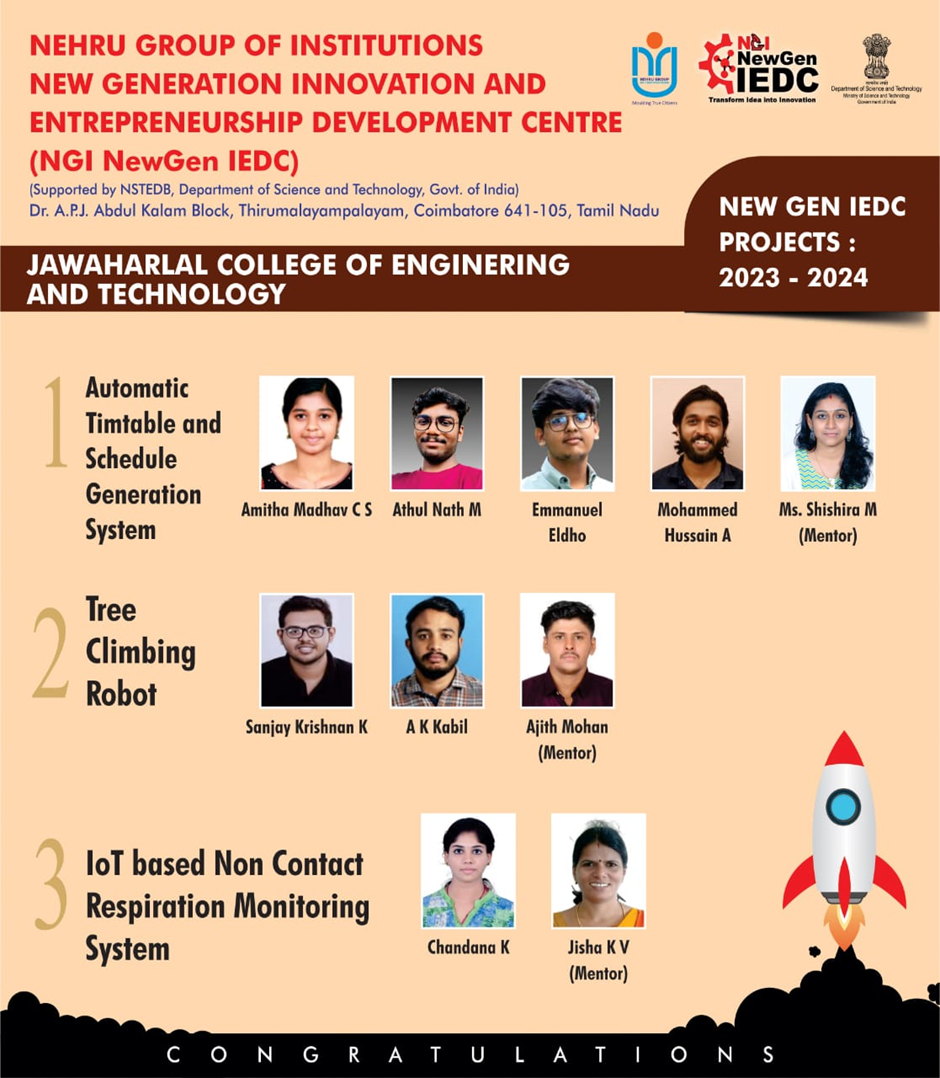
IoT based Non-Contact Respiration Monitoring System project of Ms. Chandana K, S7 ECE and Ms. Jisha K V, AP ECE (Mentor) was selected as one among the best project in New Gen IEDC Projects 2023-2024
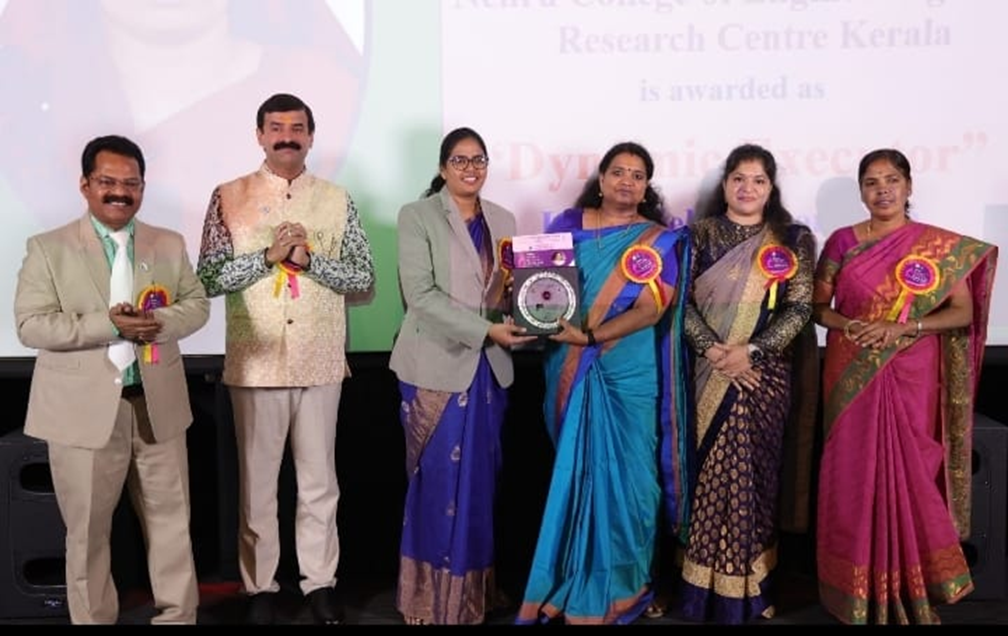
Ms. Vijitha G, AP ECE, receiving Nehru Women Excellence Award 2023 on 8th March 2023 from Ms. K S Shabeena, Judicial Magistrate, Avinashi
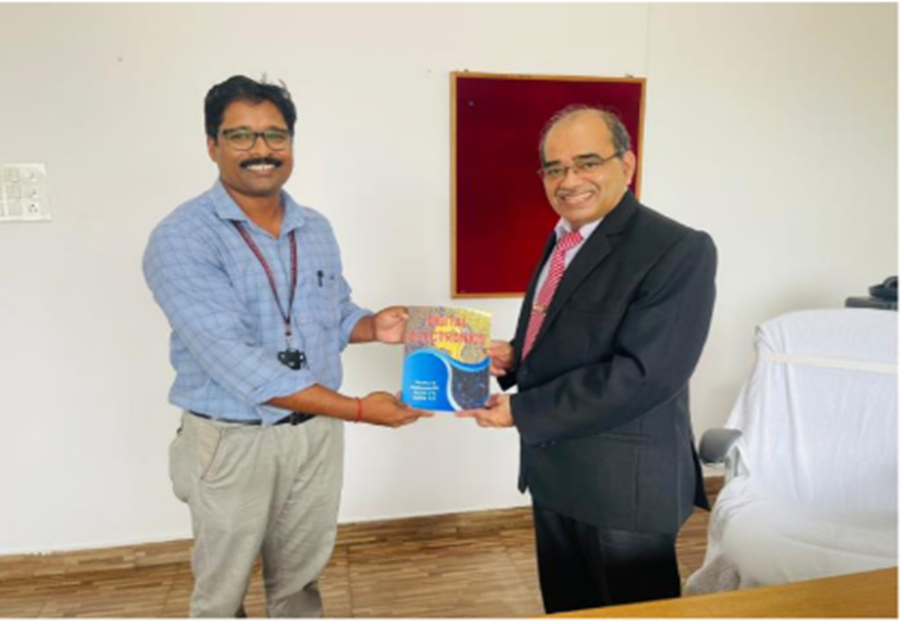
Mr Sanish V S, AP ECE presenting his book on Digital Electronics to Dr. H N Nagaraja, Executive Director, NGI
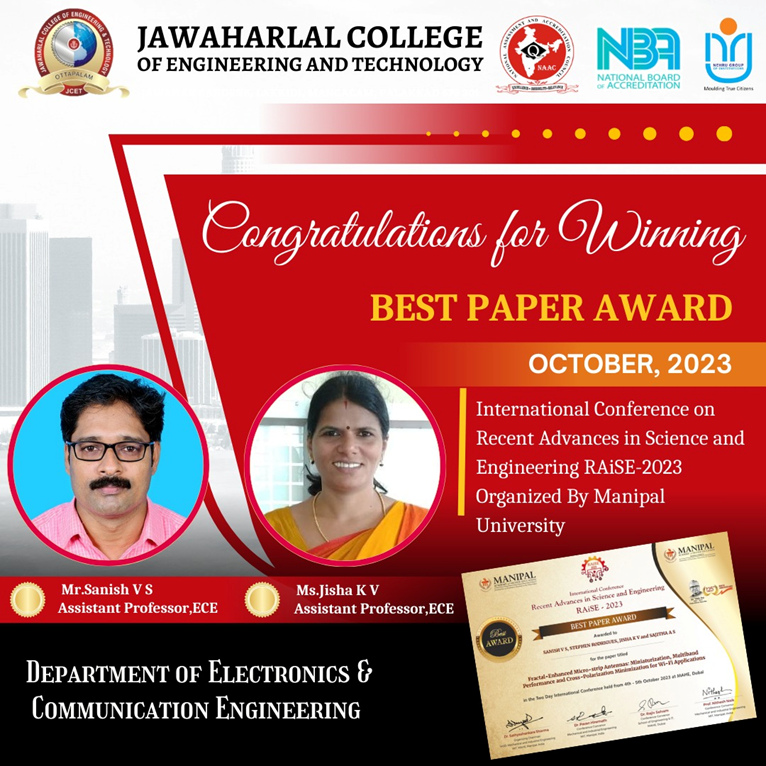
Mr. Sanish V S, AP ECE and Ms. Jisha K V, AP ECE was awarded Best Paper Award in International Conference on Recent Advances in Science and Engineering RAiSE-2023 organized by Manipal University
PAPER PUBLICATIONS
AJEENA A
- Auto focusing of in-Line Holography based on Stacked Auto Encoder with Sparse Bayesian Regression and Compressive Sensing in SCI journal Multimedia Tools and Application.
VIJITHA G
- High capacity dual data hiding in encrypted images using msb prediction, International Research Journal of Engineering and Technology (IRJET), Volume: 07 Issue: 04 | Apr 2020.
SANISH V S
- Miniaturized Koch Fractal Antenna with Reduced Cross-Polarization for WLAN Application” In International Conference ICAMT-2020.
- “Wideband hexagonal fractal antenna for WLAN & CMMB applications in Conference NeCTAR 2020
- 5G MIMO antenna design and simulation on MATLAB with Particle swam Optimization in International Research Journal of Engineering & Technology(IRJET)-Volume 7
- “Millimeter Wave Circular Microstrip Patch Antenna for 5G Applications” in International Journal of Research and Scientific Innovation (IJRSI) | Volume VI
- “A High Performance Printed Dipole Array Antenna for 2.4/5 GHz WLAN Access Points” in International Symposium on Antennas and Propagation (APSYM-2018)
VYSHAK VALSAN
- Paper titled “Image Restoration using Advanced Patch Processing Algorithm”, International Research Journal of Engineering and Technology (IRJET) Volume 7, Issue 4, April 2020
- Paper entitled “IMAGE RESTORATION USING ADVANCED PATCH PROCESSING ALGORITHM” in the National level “Virtual conference ABACon’20(Abacus Conference)” organized by the Department of Computer Science and Engineering of Sahrdaya College of Engineering and Technology, Kodakara held on 22 - June - 2020. [Proceedings of ABACon’20]
- Paper titled “WIDEBAND HEXAGONAL FRACTAL ANTENNA FOR WLAN & CMMB APPLICATIONS” in NeCTAR at NCERC on 28th and 29th May 2020. [Proceedings of NeCTAR]
HASEENA P
- Paper titled “cost effective automated crack detection using mobile robots”, GORTERIA JOURNAL, ISSN NO: 0017-2294, Volume 33, Issue 11- 2020
- Paper titled “Image encryption using deep neural networks based chaotic algorithm”, International Research Journal of Engineering and Technology (IRJET) Volume 7, Issue 4, April 2020
- Paper entitled “Automated crack detection using mobile robots” proceedings of International virtual conference on Recent innovations in science and technology –RIST 2020 organized by Transist online, an international journal.
REMYA K P
- Paper titled “Defects Detection in PCB Using Image Processing And Deep Learning”, International Research Journal of Engineering and Technology (IRJET) Volume 7, Issue 5, May 2020
JISHA K V
- Paper entitled “Design and Control of Wireless Chlorine Leakage System using Cloud Server” proceedings of International virtual conference on Recent innovations in science and technology –RIST 2020 organized by Transist online, an international journal.
SREELAKSHMI S
- Paper titled “Multiple face detection and tracking using Viola-johns algorithm, International Research Journal of Engineering and Technology (IRJET) Volume 7, Issue 4, April 2020
The Department of Electronics and Communication uniting innovation, excellence, and collaboration for a brighter future inaugurating the ECCONZ(ECE Association) 2023-2024 Activities on 17/10/23. Mr. Saji S, General Manager, District Industries Centre, Palakkad, Inaugurated ECCONZ 2023
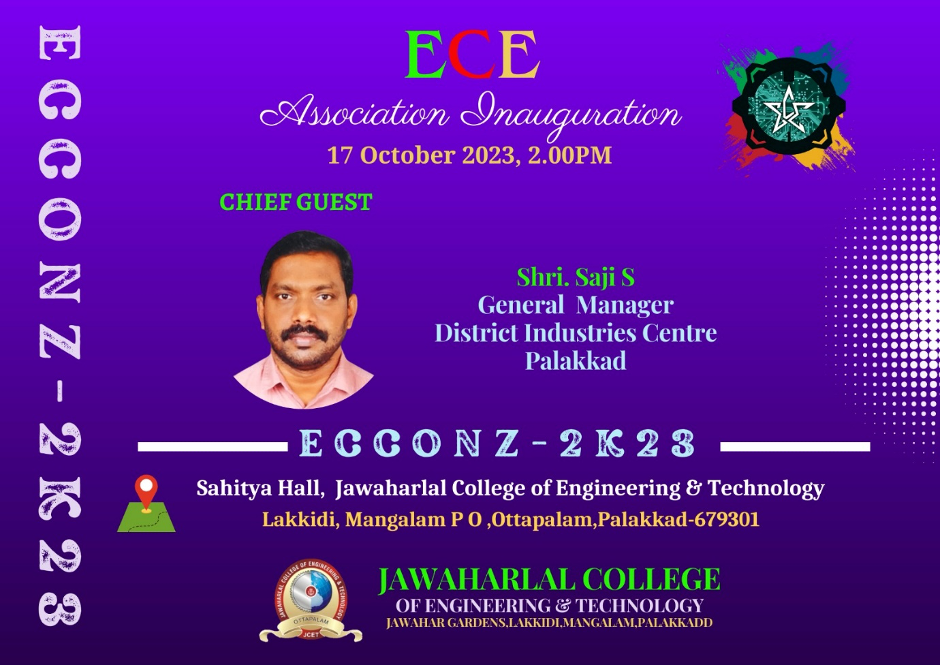
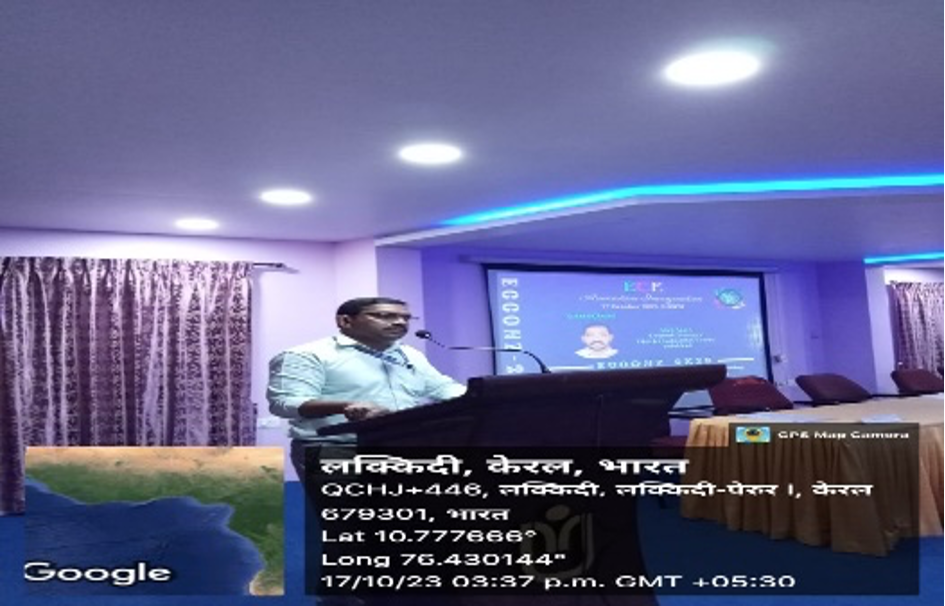
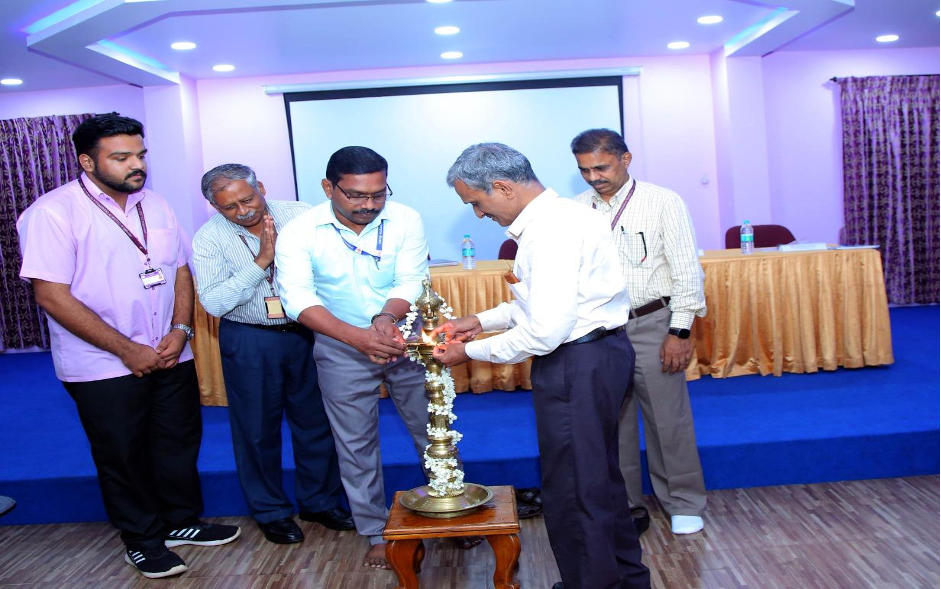
The Department of Electronics and Communication organized Project Expo with the aim of innovation, creativity, and collaboration for School Students conducted by ECE department in connection with NSITE November 2K23
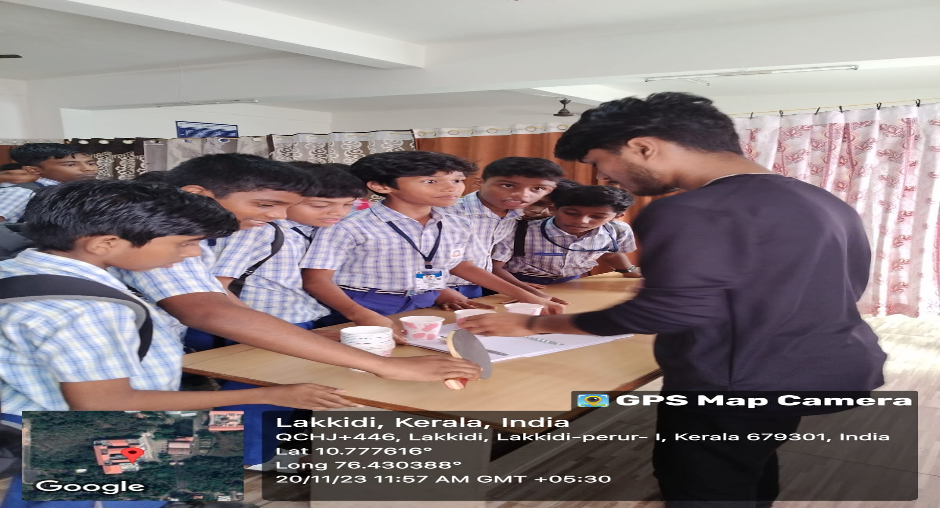
The Department of Electronics and Communication Engineering organized a Webinar on VLSI and Application on 13/12/2022. The Webinar delve into the fascinating world of Very Large Scale Integration (VLSI) technology and explore its diverse applications across various industries
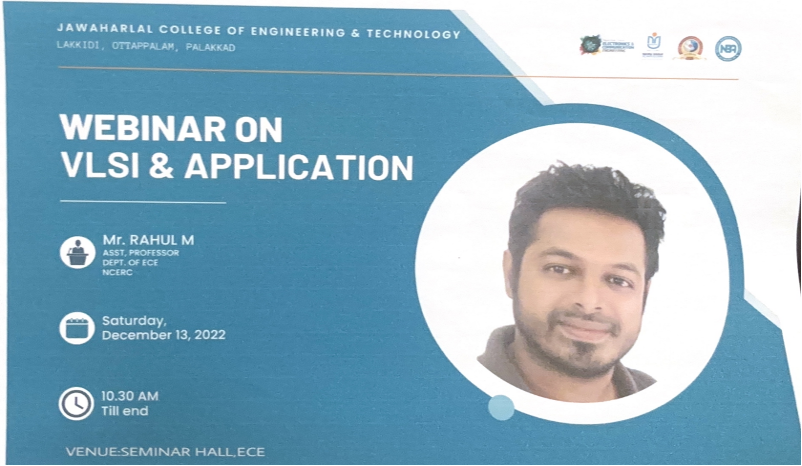
The Department Of Electronics and Communication Engineering organized ECCONZ Association Inauguration on 5/11/2022. ECE Association plays a crucial role in nurturing the talents and interests of students in Electronics and Communication Engineering, preparing them for successful careers and contributions to the field
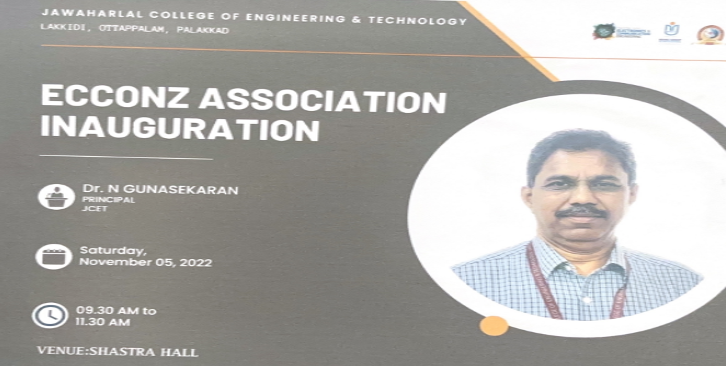
News & Events
Technical Talk on From Design to Perfection: AI Revolutionizing Additive Manufacturing

The expert talk titled From Design to Perfection: AI Revolutionizing Additive Manufacturing explores how artificial intelligence is transforming every stage of modern 3D printing from design optimization to precise manufacturing outcomes. Delivered by Mr. Harikrishnan K. S., AI Developer at Ai Build Ltd, London, the session provides valuable insights into cutting-edge AI tools, automation techniques, and their impact on the future of additive manufacturing. The talk is scheduled for October 17, 2025, from 2:30 PM to 3:30 PM.
The Smart Plantation System for Sustainable Agriculture outreach program

The Smart Plantation System for Sustainable Agriculture outreach program aims to introduce students and the local community to innovative farming technologies that promote efficiency and environmental sustainability. Through a practical demonstration of smart plantation methods, participants will learn how technology can improve crop monitoring, resource usage, and overall agricultural productivity. The session will be inaugurated and concluded by the Community Head / School Principal of VRCMUP School, highlighting the institution�s commitment to fostering awareness and sustainable practices.
Technical Workshop - BitGen : FPGA Design and Development using Vivado

The BitGen: FPGA Design and Development using Vivado workshop offers a hands-on introduction to FPGA architecture, HDL design, and Vivado-based development workflows. Guided by CDAC Trivandrum engineers Mr. Muhammed Alfin A and Mr. Balagopalan A G, participants will learn to design, simulate, and implement digital systems on FPGA platforms. The one-day workshop, held on December 1st, 2025 (9:00 AM to 4:00 PM), aims to equip learners with essential skills for modern digital hardware development.
FDP on Microwave and Millimeter wave Communication Technologies

6 days Online FDP on Microwave and Millimeter wave Communication Technologies was organized by ECE Dept sponsored by ATAL.
Host Energy Quiz Competition

KSEB Engineers Association and ECE Department Host Energy Quiz Competition for JCET Students
Placements
| No.of Students | No.of Students Placed | |
| CAY (24–25) | 38 | 30 |
| CAYM1 (23–24) | 20 | 17 |
| CAYM2 (22–23) | 17 | 8 |
| CAYM3 (21–22) | 21 | 19 |
Our Recruiters




















Vision
- To become a Centre of Academic Excellence and Research in the field of ECE to raise Engineers with standards and ethical values with the ability to apply acquired knowledge to find solutions for technologically challenging practical problems.
Mission
- To impart high-quality education through competent staff and state of art infrastructure.
- To provide conducive environment for students to nurture talent and holistic personality development with ethical and human values.
- To develop research linkage with leading organisations in India to satisfy the needs of society.
- To enable student’s skills to solve complex engineering problems in the industry and society in current trends.
E - Learning
Program Educational Objectives (PEO)
- Graduates of Electronics and Communication Engineering will be able to Pursue higher education in interdisciplinary areas or will acquire the required professional skills that make them ready for immediate employment.
- Graduates of Electronics and Communication Engineering will be able to Formulate and solve the contemporary issues in industry and society.
- Graduates of Electronics and Communication Engineering will be able to build ethical practices, communication skills and leadership qualities to accomplish in society and nation development.
Program Specific Outcomes (PSOs)
The Program Specific Outcomes (PSOs) of the program B.Tech
Electronics and Communication Engineering are listed below;
Students of the program will be able to:
- Apply science & mathematics through differential and integral calculus; to solve complex electronics and communication engineering problems.
- Attain the ability to interpret the methods of electronic systems and technical specifications to provide solutions for real life problems in the society.
- Competence in utilizing electronic current advances (both software and hardware) for the design and analysis of complex electronic frameworks in research activities.
SEMESTER 1 (KTU 2019 Scheme)
|
Sl. No |
Subject Code |
Name of Subject |
Name of Text Book |
Name of Reference Book |
|
1 |
MAT101 |
Linear Algera and Calculus |
H Anton,I Biven,S Davis,Calculus,Wiley 10th edition ,2015. 2) Erwin Kreyszig AdvancedEngineering Mathematics ,10th edition John Wily & sons 2016 |
|
|
2 |
PHT 100 |
Engineering Physics A |
M.N.Avadhanulu, P.G.Kshirsagar, TVS Arun Murthy “A Text book of Engineering Physics”, S.Chand &Co., Revised Edition 2019 |
Arthur Beiser, “Concepts of Modern Physics ", Tata McGraw Hill Publications, 6th Edition |
|
3 |
EST100 |
Engineering Mechanics |
Engineering Mechanics, J Benjamin, 2019 Revised Edition |
Timoshenko and Young, Engineering Mechanics, McGraw Hill Publishers |
|
4 |
EST 130 A |
Basics of Electrical Engineering |
Basic Electrical Engineering by T S Rejin The New Media space publication |
1. Basic Electrical Engg by V K Mehta and Rohit Mehta S. Chand Publication 2. Basic Electrical Engineering by J B Gupta S K Kataria & Sons publication |
|
5 |
EST 130 B |
Basics of Electronics Engineering |
ChinmoySaha, Arindham Halder and Debarati Ganguly, Basic Electronics - Principles and Applications, Cambridge University Press, 2018. |
Anant Agarwal, Jeffrey Lang, Foundations of Analog and Digital Electronic Circuits, Morgan Kaufmann Publishers, 2005. |
|
6 |
HUN 101 |
Life Skills |
Life Skills of Engineers, Ramesh.S,Vishnu R G,Ridhaima Publication, Trivandram |
|
|
7 |
PHL120 |
Engineering Physics Lab |
S L Gupta & Dr V Kumar, Practical Physics With Viva Voice, Pragati Prakashan Publishers,, Revised Edition 2014 |
|
SEMESTER 2 (KTU 2019 Scheme)
|
Sl. No |
Subject Code |
Name of Subject |
Name of Book |
Name of Reference Book |
|
1 |
MAT 102 |
Vector calculus, Differential Equations and Transformations |
H Anton,I Biven,S Davis, Calculus, Wiley 10th edition ,2015.2) Erwin Kreyszig Advanced Engineering Mathematics ,10th edition John Wily & sons 2016 |
|
|
2 |
CYT 100 |
Engineering Chemistry |
Dr Muhammed Arif M,Smt Kavitha P Nair,Dr Annette Fernandence |
|
|
3 |
EST 110 |
Engineering Graphics |
Engineering Graphics by P. I. Varghese published by V I P Publishers |
|
|
4 |
EST 120 A |
Basics of Civil Engineering |
Rangwala, S. C., Essentials of Civil Engineering, Charotar Publishing House |
Shibu Nalapat, Basic Civil Engineering, Nalapat Publishers |
|
5 |
EST 120 B |
Basics of Mechanical Engineering |
Benjamin,J.,Basic Mechanical Engineering, Pentex Books, 9th Edition,2018 |
Balachandran, P.Basic Mechanical Engineering, Owl Books |
|
6 |
HUN 102 |
Professional Communication |
Professional English, M A Ashraf Rizvi, Effective Technical Communication, Tata McGraw-Hill Publishers |
|
|
7 |
EST 102 |
Programming in C |
Asok N Kamthane, Pearson, Programming in C |
Rajaraman V, PHI, Computer Basics and Programming in C |
|
8 |
CYL 120 |
Engineering Chemistry Lab |
G. Svehla, B. Sivasankar, “Vogel's Qualitative Inorganic Analysis”, Pearson, 2012 |
|
|
9 |
ESL 120 |
Civil & Mechanical Workshop |
Khanna P.N, “Indian Practical Civil Engineering Handbook”, Engineers Publishers. |
S. C. Rangwala, “Engineering Materials,” Charotar Publishing House |
SEMESTER 3 (KTU 2019 Scheme)
|
Sl. No |
Subject Code |
Name of Subject |
Name of Text Book |
Name of Reference Book |
|
1 |
MAT 201 |
PARTIAL DIFFERENTIAL EQUATIONS AND COMPLEX ANALYSIS |
1. B.S. Grewal, Higher Engineering Mathematics, Khanna Publishers, 44th Edition, 2018. 2. Erwin Kreyszig, Advanced Engineering Mathematics, 10th Edition, John Wiley & Sons, |
1. Peter V. O'Neil, Advanced Engineering Mathematics, Cengage, 7th Edition, 2012 |
|
2 |
ECT201 |
SOLID STATE DEVICES |
Ben G. Streetman and Sanjay Kumar Banerjee, Solid State Electronic Devices, Pearson |
Neamen, Semiconductor Physics and Devices, McGraw Hill, 4/e, 2012 |
|
3 |
ECT 203 |
LOGIC CIRCUIT DESIGN |
D.V. Hall, “Digital Circuits and Systems”, Tata McGraw Hill, 1989 |
A. Ananthakumar ,”Fundamentals of Digital Circuits”, Prentice Hall, 2nd edition, |
|
4 |
ECT 205 |
NETWORK THEORY |
Valkenburg V., “Network Analysis”, Pearson, 3/e, 2019, Sudhakar A, Shyammohan S. P., “Circuits and Networks- Analysis and Synthesis”, McGraw Hill, |
Edminister, “Electric Circuits – Schaum’s Outline Series”, McGraw-Hill, 2009. |
|
5 |
EST 200 |
DESIGN AND ENGINEERING |
1) YousefHaik, Sangarappillai Sivaloganathan, Tamer M. Shahin, Engineering Design Process, 2) Voland, G., Engineering by Design, Pearson India 2014, Second Edition, ISBN 9332535051 |
Philip Kosky, Robert Balmer, William Keat, George Wise, Exploring Engineering, Fourth |
|
6 |
MCN201 |
SUSTAINABLE ENGINEERING |
Allen, D. T. and Shonnard, D. R., Sustainability Engineering: Concepts, Design and Case Studies, Prentice Hall |
Bradley. A.S; Adebayo,A.O., Maria, P. Engineering applications in sustainable design and development, |
SEMESTER 4 (KTU 2019 Scheme)
|
Sl. No |
Subject Code |
Name of Subject |
Name of Book |
Name of Reference Book |
|
1 |
MAT 204 |
PROBABILITY, RANDOM |
1. (Text-1) Jay L. Devore, Probability and Statistics for Engineering and the Sciences, 8th edition, Cengage, 2012 3. (Text-3) Erwin Kreyszig, Advanced Engineering Mathematics, 10th Edition, John Wiley & Sons, 2016. |
1. Hossein Pishro-Nik, Introduction to Probability, Statistics and Random Processes, Kappa Research, 2014 ( Also available online at www.probabilitycourse.com ) |
|
2 |
ECT 202 |
ANALOG CIRCUITS |
Robert Boylestad and L Nashelsky, “Electronic Devices and Circuit Theory”, 11/e Pearson, 2015 |
Razavi B., “Fundamentals of Microelectronics”, Wiley, 2015 |
|
3 |
ECT 204 |
SIGNALS AND SYSTEM |
1. Alan V. Oppenheim and Alan Willsky, Signals and Systems, PHI, 2/e, 2009 |
Anand Kumar, Signals and Systems, PHI, 3/e, 2013. |
|
4 |
ECT 206 |
COMPUTER ARCHITECTURE AND |
Muhammed Ali Mazidi & Janice Gilli Mazidi, R.D. Kinley, The 8051 microcontroller and Embedded System, Pearson Education, 2nd edition. |
Steve Furber, ARM System - on-chip Architecture, Pearson Education |
|
5 |
HUT 200 |
Professional Ethics |
M Govindarajan, S Natarajan and V S Senthil Kumar, Engineering Ethics, PHI Learning Private Ltd, New Delhi,2012. |
Mike W Martin and Roland Schinzinger, Ethics in Engineering,4th edition, Tata McGraw Hill Publishing Company Pvt Ltd, New Delhi,2014. |
|
6 |
MCN 202 |
CONSTITUTION OF INDIA |
D D Basu, Introduction to the constitution of India, Lexis Nexis, New Delhi, 24e, 2019 |
Ministry of law and justice, The constitution of India, Govt of India, New Delhi, 2019. |
SEMESTER 5 (KTU 2019 Scheme)
|
Sl. No |
Subject Code |
Name of Subject |
Name of Text Book |
Name of Reference Book |
|
1 |
ECT 301 |
LINEAR INTEGRATED CIRCUITS |
1. D.Roy Choudhry, Shail Jain, ―Linear Integrated Circuits‖, New Age International |
1. Ramakant A. Gayakwad, ―OP-AMP and Linear ICs‖, 4th Edition, Prentice Hall / Pearson |
|
2 |
ECT 303 |
DIGITAL SIGNAL PROCESSING |
Oppenheim A. V., Schafer R. W. and Buck J. R., Discrete Time Signal Processing, 3/e, Prentice Hall, 2007. |
Chassaing, Rulph., DSP applications using C and the TMS320C6x DSK. Vol. 13. John Wiley & Sons, 2003. 2. Ifeachor E.C. and Jervis B. W., Digital Signal Processing: A Practical Approach, 2/e, Pearson Education, 2009. 3. Lyons, Richard G., Understanding Digital Signal Processing, 3/e. Pearson Education India, 2004. 4. Mitra S. K., Digital Signal Processing: A Computer Based Approach, 4/e McGraw Hill (India), 2014. 5. NagoorKani, Digital Signal Processing, 2e, Mc Graw –Hill Education New Delhi, 2013 6. Salivahanan, Digital Signal Processing,3e, Mc Graw –Hill Education New Delhi, 2014 (Smart book) 7. Singh A., Srinivasan S., Digital Signal Processing: Implementation Using DSP Microprocessors, Cenage Learning, 2012. |
|
3 |
ECT 305 |
ANALOG AND DIGITAL COMMUNICATION |
John G. Proakis, Masoud Salehi, Digital Communication, McGraw Hill Education |
Couch: Analog and Digital Communication. 8e, Pearson Education India, 2013 2. H.Taub and Schilling Principles of Communication Systems, , TMH, 2007 3. K.Sam Shanmugham, Digital and Analog Communication Systems, John Wiley & Sons |
|
4 |
ECT 307 |
CONTROL SYSTEMS |
Farid Golnaraghi, Benjamin C. Kuo, Automatic Control Systems, 9/e, Wiley India. |
Gopal, Digital Control and State Variable Method, 4/e, McGraw Hill Education India |
|
5 |
HUT300 |
INDUSTRIAL ECONOMICS AND FOREIGN TRADE |
NA |
|
|
6 |
MCN301 |
DISASTER MANAGEMENT |
Andrew, S., “Environmental Modeling with GIS and Remote Sensing”, John Willey and |
Ariyabandu, M. and Sahni P. (Eds), “Disaster Risk Reduction in South Asia”, Prentice- |
SEMESTER 6 (KTU 2019 Scheme)
|
Sl. No |
Subject Code |
Name of Subject |
Name of Book |
Name of Reference Book |
|
1 |
ECT 302 |
ELECTROMAGNETICS |
1. Mathew N O Sadiku "Elements of Electromagnetics" Oxford University 2014e 2. John D Kraus "Electromagnetics" TMH 2010 |
Schaum's Outline of Electromagnetics, 4th Edition (Schaum's Outlines) 4th Edition, Kindle Edition |
|
2 |
ECT 304 |
VLSI CIRCUIT DESIGN |
John P Uyemura, Introduction to VLSI Circuits and Systems, |
Jan M.Rabaey, Digital Integrated Circuits- A Design Perspective, Prentice Hall, Second |
|
3 |
ECT 306 |
INFORMATION THEORY AND CODING |
"P S Sathya Narayana, Concepts of Information Theory & Coding, Dynaram Publications, 2005 |
Bose, Information theory coding and cryptography, 3/e McGraw Hill Education India , 2016 2. D.E.R. Denning, Cryptography and Data Security, Addison Wesley, 1983. 3. J S Chitode, Information Theory and Coding, Technical Publications, Pune, 2009 4. Kelbert & Suhov, Information theory and coding by examples, Cambridge University Press, 2013 5. Shu Lin & Daniel J. Costello. Jr., Error Control Coding : Fundamentals and Applications, 2/e, Prentice Hall Inc., Englewood Cliffs, NJ,2004 |
|
4 |
ECTXXX |
PROGRAM ELECTIVE I |
XX |
XX |
|
5 |
HUT310 |
MANAGEMENT FOR ENGINEERS |
NA |
|
|
6 |
ECT 308 |
COMPREHENSIVE COURSE WORK |
NA |
|
Note: Syllabus not published for 2019 Scheme S5 & S6 by university (as on date 18.06.2021). The text and reference books enterd based on the previous scheme subjects.
SEMESTER 7 (KTU 2019 Scheme)
|
Sl. No |
Subject Code |
Name of Subject |
Name of Text Book |
Name of Reference Book |
|
1 |
|
|
|
|
|
2 |
EC403 |
MICROWAVE & RADAR |
Samuel Y. Liao, Microwave Devices and Circuits, 3/e, Pearson Education, 2003. |
Kulkarni M, Microwave and Radar Engineering, 4/e, Umesh Publications, 2012. |
|
3 |
EC401 |
Information Theory & Coding |
P S Sathya Narayana, Concepts of Information Theory & Coding, Dynaram Publications, 2005 |
Bose, Information theory coding and cryptography, 3/e McGraw Hill Education India , 2016 2. D.E.R. Denning, Cryptography and Data Security, Addison Wesley, 1983. 3. J S Chitode, Information Theory and Coding, Technical Publications, Pune, 2009 4. Kelbert & Suhov, Information theory and coding by examples, Cambridge University Press, 2013 5. Shu Lin & Daniel J. Costello. Jr., Error Control Coding : Fundamentals and Applications, 2/e, Prentice Hall Inc., Englewood Cliffs, NJ,2004 |
|
4 |
EC403 |
Microwave & Radar Eng |
Merrill I. Skolnik, Introduction to Radar Systems, 3/e, Tata McGraw Hill, 2008. |
1. Das, Microwave Engineering, 3/e, McGraw Hill Education India Education , 2014 |
|
5 |
EC405 |
Optical Communication |
Gerd Keiser, Optical Fiber Communications, 5/e, McGraw Hill, 2013. |
Chakrabarthi, Optical Fibre Communication, McGraw Hill, 2015. |
|
6 |
EC407 |
Computer Communication |
Data Communication and networks, Behrouz A Furozan |
Behrouz A Forouzan, Data Communications and Networking, 4/e, Tata McGraw-Hill, |
SEMESTER 8 (KTU 2019 Scheme)
|
Sl. No |
Subject Code |
Name of Subject |
Name of Book |
Name of Reference Book |
|
1 |
EC402 |
NANOELECTRONICS |
J.M. Martinez-Duart, R.J. Martin Palma, F. Agulle Rueda Nanotechnology for |
Chattopadhyay, Banerjee, Introduction to Nanoscience & Technology, PHI, 2012 |
|
2 |
EC404 |
ADVANCED COMMUNICATION SYSTEMS |
Dennis Roody, Satellite communication, 4/e, McGraw Hill, 2006. |
MIshra, Wireless communications and Networks, McGraw Hill, 2/e, 2013 |
|
3 |
EC468 |
SECURE COMMUNICATION |
Cryptography and network security., William stallings |
David S. Dummit & Richard M Foote, Abstract Algebra, 2nd Edition, Wiley India Pvt. Ltd., 2008. 2. Douglas A. Stinson, Cryptography, Theory and Practice, 2/e, Chapman & Hall, CRC Press Company, Washington, 2005. 3. Lawrence C. Washington, Elliptic Curves: Theory and Cryptography, Chapman & Hall, CRC Press Company, Washington, 2008. 4. N. Koeblitz: A course in Number theory and Cryptography, 2008 5. Thomas Koshy: Elementary Number Theory with Applications, 2/e, Academic Press, 2007 6. Tyagi and Yadav , Cryptography and network security, Dhanpatrai, 2012 |
|
4 |
CE488 |
DISASTER MANAGEMENT |
Andrew, S., “Environmental Modeling with GIS and Remote Sensing”, John Willey and |
Ariyabandu, M. and Sahni P. (Eds), “Disaster Risk Reduction in South Asia”, Prentice- |
|
5 |
IE488 |
TOTAL QUALITY MANAGEMENT |
Sharma D D, Total Quality Management, Sultan Chand & Sons, 2014 |
1. R.P. Mohanty & R R Lakhi, Total Quality Management, Jaico Pub, New Delhi, 1994 |
|
6 |
MA482 |
APPLIED LINEAR ALGEBRA |
1. Gilbert Strang Linear Algebra and It’s Applications, 4th edition, Cengage Learning, 2006. |
1. I.N Herstein, Topics in Linear Algebra, Wiley Eastern, 1975. |
NBA
CRITERIA 2
Criteria 2 - 2.1.1
| 2.1.1 | Figure 2.1.1a Course components of the curriculum (R2015) | View Image |
| 2.1.1 | Figure 2.1.1b Course components of the curriculum (R2019) | View Image |
| 2.1.1 | Figure 2.1.1c Flowchart for Gap Identification Methodology | View Image |
Criteria 2 - 2.2.1
| 2.2.1 | Calender 1 | View Image |
| 2.2.1 | Calender 2 | View Image |
| 2.2.1 | Calender 3 | View Image |
| 2.2.1 | Calender 4 | View Image |
| 2.2.1 | Fig 2.2.1a Process to improve the quality of teaching and learning process | View Image |
| 2.2.1 | Figure 2.2.1b Flowchart for Identification of Slow and Advanced Learners | View Image |
| 2.2.1 | Figure 2.2.1c Sample of Lecture Plan of ECT 204 Signals and Systems | View Image |
| 2.2.1 | Figure 2.2.1d Sample of Feedback | View Image |
Criteria 2 - 2.2.2
| 2.2.2 | 2.2.2a | View Image |
| 2.2.2 | Figure 2.2.2b Blooms Taxonomy | View Image |
| 2.2.2 | Figure 2.2.2c Sample Question Paper of Internal Assessment Test | View Image |
| 2.2.2 | Figure 2.2.2d Sample Answer Booklet of Internal Assessment Test | View Image |
| 2.2.2 | Figure 2.2.2e Sample assignment questions with allocation of marks and itтАЩs mapping with COs | View Image |
| 2.2.2 | Fig 2.2.2f Sample of Assignment Book Index Page | View Image |
Criteria 2 - 2.2.3
| 2.2.3 | Figure 2.2.3a Workflow diagram of Project | View Image |
| 2.2.3 | Figure 2.2.3b Major Steps of Student Project | View Image |
Criteria 2 - 2.2.4
| 2.2.4 | Figure 2.2.4a SDPK Lab | View Image |
Criteria 2 - 2.2.5
| 2.2.5 | Figure 2.2.5a Industrial Visit to IHFC, IIT Delhi, Sonipat Campus | View Image |
| 2.2.5 | Figure 2.2.5b Industrial Visit to Joy Technologies, Navalur | View Image |
| Criteria 2 | Updated Gap Flowchart | View Image |
| Criteria 2 | Question Paper Setting New | View Image |
| Criteria 2 | Sample Feedback | View Image |
CRITERIA 3
| Criteria 3 | Employer Satisfaction Survey | View Image |
| Criteria 3 | Survey Alumni | View Image |
| Criteria 3 | Survey Exit | View Image |
| Criteria 3 | Doc1 | View Image |
CRITERIA 4
| Criteria 4 | Agira | View Image |
| Criteria 4 | Bharat Blockchain Yatra | View Image |
| Criteria 4 | News letter (1) | View Image |
| Criteria 4 | Wavelet.jpeg | View Image |
CRITERIA 5
| Criteria 5 | 5.5.1. | View Image |
| Criteria 5 | 5.5.2. | View Image |
| Criteria 5 | 5.5.3. | View Image |
| Criteria 5 | 5.5.4. | View Image |
| Criteria 5 | 5.5.5. | View Image |
| Criteria 5 | 5.5.6. | View Image |
| Criteria 5 | 5.5.7. | View Image |
| Criteria 5 | 5.5.8. | View Image |
| Criteria 5 | 5.5.9. | View Image |
| Criteria 5 | 5.7.3.1. | View Image |
| Criteria 5 | 5.7.3.2. | View Image |
| Criteria 5 | 5.7.3.3. | View Image |
| Criteria 5 | 5.7.3.4. | View Image |
| Criteria 5 | 5.8. | View Image |
| Criteria 5 | 5.5.10. | View Image |
| Criteria 5 | 5.5.11. | View Image |
| Criteria 5 | Best Paper | View Image |
| Criteria 5 | Apraisal 1 | View Image |
| Criteria 5 | Apraisal 2 | View Image |
| Criteria 5 | E-learning | View Image |
| Criteria 5 | Newsletter Volume 5, Issue 2 | View Image |
CRITERIA 6
| Criteria 6 | 1 | View Image |
| Criteria 6 | 2 | View Image |
| Criteria 6 | 3 | View Image |
| Criteria 6 | 4 | View Image |
| Criteria 6 | 5 | View Image |
| Criteria 6 | 6 | View Image |
| Criteria 6 | 7 | View Image |
| Criteria 6 | 8 | View Image |
| Criteria 6 | 9 | View Image |
| Criteria 6 | 10 | View Image |
| Criteria 6 | 11 | View Image |
| Criteria 6 | 12 | View Image |
| Criteria 6 | 13 | View Image |
| Criteria 6 | 14 | View Image |
| Criteria 6 | 15 | View Image |
| Criteria 6 | 16 | View Image |
| Criteria 6 | 17 | View Image |
| Criteria 6 | 18 | View Image |
| Criteria 6 | 19 | View Image |
| Criteria 6 | 20 | View Image |
| Criteria 6 | 21 | View Image |
| Criteria 6 | Picture 1 | View Image |
| Criteria 6 | Picture 2 | View Image |
| Criteria 6 | Picture 3 | View Image |
| Criteria 6 | Picture 4 | View Image |
| Criteria 6 | Picture 5 | View Image |
| Criteria 6 | Picture 7 | View Image |
| Criteria 6 | Picture 8 | View Image |
| Criteria 6 | Picture 9 | View Image |
CRITERIA 7
| Criteria 7 | 7.2 a Certificate of COMPLIANCE | View Image |
| Criteria 7 | 7.2c,7.2d,7.2e | View Image |
| Criteria 7 | 7.2 f Audit_Report_2022 - 2023_Even | View Image |
| Criteria 7 | 7.2 c Action Taken | View Image |
| Criteria 7 | 7.2 d Non Comformance | View Image |
| Criteria 7 | 7.2 d Non Comformance 3 | View Image |
| Criteria 7 | 7.2 Internal Audit Report | View Image |
| Criteria 7 | 7.2d Non Conformance 2 | View Image |
| Criteria 7 | 7.2d Non Conformance 4 | View Image |
| Criteria 7 | 7.2 Internal Audit Report 2 | View Image |
| Criteria 7 | External Audit 1 | View Image |
| Criteria 7 | External Audit 2 | View Image |
CRITERIA 9
| Criteria 9 | Picture 1 | View Image |
| Criteria 9 | Picture 2 | View Image |
| Criteria 9 | Picture 3 | View Image |
| Criteria 9 | Picture 4 | View Image |
| Criteria 9 | Picture 5 | View Image |
| Criteria 9 | Picture 6 | View Image |
| Criteria 9 | Picture 7 | View Image |
| Criteria 9 | Picture 8 | View Image |
| Criteria 9 | Picture 9 | View Image |
| Criteria 9 | Picture 10 | View Image |
| Criteria 9 | Picture 11 | View Image |
| Criteria 9 | Picture 12 | View Image |
| Criteria 9 | Picture 13 | View Image |
| Criteria 9 | Picture 14 | View Image |
| Criteria 9 | Picture 15 | View Image |
| Criteria 9 | Picture 16 | View Image |
| Criteria 9 | Picture 17 | View Image |
| Criteria 9 | Picture 18 | View Image |
| Criteria 9 | Picture 19 | View Image |
| Criteria 9 | Picture 20 | View Image |
| Criteria 9 | Picture 21 | View Image |
| Criteria 9 | Picture 22 | View Image |
| Criteria 9 | Picture | View Image |
CRITERIA 10
| Criteria 10 | Organizational Chart | View Image |
Other Links
- B.Tech. Aeronautical Engineering
- B.Tech. Civil Engineering
- B.Tech. Computer Science and Engineering
- B.Tech. Electronics and Communication Engineering
- B.Tech. Mechanical Engineering
- M.Tech. Applied Electronics And Communication Systems
- M.Tech. Communication Engineering and Signal Processing
- MBA
- Agriculture Engineering
- Computer Science & Engineering (Cyber Security)
- Computer Science & Engineering (Data Science)
Copyright © 2025 | All Rights Reserved.
